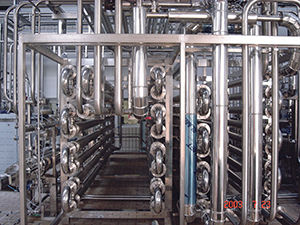by Matt Hale, International Sales & Marketing Director, HRS Heat Exchangers

Functional drinks and drinks based on plant extracts – in particular, those containing cannabis- or hemp-derived ingredients like CBD – are one of the fastest growing segments of the beverage category.
As with any new and developing market, some companies will be more successful than others. However, while some of the hype around the market and the products is reducing, there is no doubt about the potential for profit.
Those companies which want to have long-term success will need to efficiently scale-up production while maintaining the physical and chemical characteristics which make their products unique and desirable. Learning from existing beverage manufacturers will be essential.
Market opportunities
Around the world projected valuations for the recreational CBD products (as opposed to medical markets) have recently been revised downwards as investors begin to workout which start-ups are feasible long-term businesses and which have no experience and no revenue. However, the demand is clear. For example, in US states where cannabis is legal for recreational use, drinks make up 15% of purchased cannabis products, and around the world one-in-four consumers say they would be willing to try cannabis-infused drinks*.
Entering this market is not for the faint-hearted. The limitations and prohibitions on different products in different countries (and even states) prevent the export of even successful products from one region to another without meeting a whole new range of tests and approvals, but despite the difficulties, legislation and licensing requirements around the world things are becoming clearer all the time and a number of consultancies operate in different countries to provide help and advice.
Technical challenges
The technical challenges do not just revolve around the issues of product formulation. The exact nature of the compounds found in the plant can vary according to the growing environment of the plants and how they are processed. In some countries product approval is dependent on being able to prove product consistency, while product stability is another key consideration. Other regions classify products a novel food and so stability of the product from manufacturer to consumption must be proven.

Scaling-up production
Heat exchangers play a key role in the manufacture of many beverage products, and cannabis infused drinks have the same requirements for pasteurisation, sterilisation, cooking or cooling as any other beverage.
High-Temperature, Short-Time (HTST) pasteurisation techniques help to preserve the flavour and texture (including the crucial emulsion) of many drinks, while cooling can involve chilled water or specific materials such as glycol. Evaporation using heat exchangers is also an efficient method of concentrating products to achieve the required formulation.
The type and model of heat exchanger will depend on many different factors, such as the nature of the process to be carried out (pasteurisation, sterilisation, dehydration, etc) and the viscosity of the drink being processed, but HRS has a complete range of products from simple tube-in-tube designs to reciprocating scraped-surface designs, all of which combine efficient heat transfer with delicate product handling; ensuring that products remain in emulsion and that the product does not foul the equipment.
T 01923 232335
info@uk.hrs-he.com
www.hrs-heatexchangers.com
*https://harpers.co.uk/news/fullstory.php/aid/27304/_91Lipstick_effect_92_driving_boom_in_CBD_and_cannabis-infused_drinks.html
